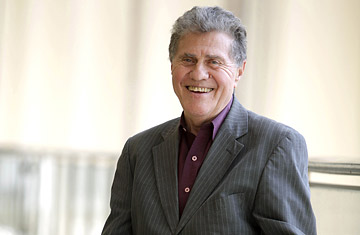
Clarinetist Stanley Drucker has been with the New York Philharmonic for 60 years
Stanley Drucker was still a teenager when he joined the New York Philharmonic as a clarinetist in 1948. More than 10,000 concerts later, Drucker is now the longest-serving member in the renowned symphony's 167-year history. Named principal clarinet by conductor Leonard Bernstein in 1960, Drucker holds the Guinness world record for the longest career of any clarinetist. On July 31, Drucker, now 80, will make his final appearance with the philharmonic in Vail, Colo. He spoke with TIME about his career, the future of classical music and the performances he'll always remember.
You got your first clarinet at age 10 from your parents. What did you think of it at first?
I probably didn't care for it very much — at that age, I was out playing in a vacant lot, mostly. It was a slow beginning, I had to learn how to get a sound out of a cold clarinet. After I crossed the first hurdle, it got a little bit easier, and there was no turning back.
The clarinet was common in popular music back then. Who were some musical icons for you?
Well, of course the influence from my parents was Benny Goodman and Artie Shaw. They were the kings of clarinet. One of my first times listening to the clarinet was someone playing klezmer music in the backyard of my apartment in Brooklyn. People would throw coins down to this fellow.
It didn't take you long to become a very good player. By 16, you were lead clarinetist for the Indianapolis Symphony Orchestra.
Everything happened very quickly by the time I got out of high school. I was playing with all kinds of amateur groups. Any group that had a rehearsal, I went to. I'd leave one rehearsal before it was over to go to the next one.
Auditioning for the New York Philharmonic must have been like trying out for the New York Yankees.
It was. Fortunately, I was so young, it didn't psych me out. You just did it.
Let's fast-forward a bit — you've now played some 10,200 concerts under nine philharmonic conductors. Is walking onto that stage before a performance now very different from when you started playing?
There are a lot of similarities. It's the same rush, the same concentration. You try to make it a first-time experience. It's a challenge every time.
What concerts stand out as being particularly memorable?
Oh, there are any number. My memory bank is full. Certainly, the first time I heard the Shostakovich violin concerto with [Russian violinist] David Oistrakh at its premiere in 1956 at Carnegie Hall. It was an amazing sound. A high point for me was doing the Freedom Concert in East Berlin, when we did Beethoven's Ninth Symphony on Christmas morning in 1989. The wall was coming down, and Leonard Bernstein changed the German text in the Ode to Joy from "joy" to "freedom." It was a very moving experience. You heard hammers and pickaxes from the concert hall.
And of course, you can be heard playing solo in Woody Allen's Manhattan, at the opening of Gershwin's Rhapsody in Blue.
I was very proud of playing that. It's kind of a neat solo to play.
How do you think the classical-music world has changed since you started? Is it still healthy?
I'd say there's a very stable audience base. We see it week after week. In great cities like New York, there's an audience for almost any type of art. In fact, I think it's grown to an extent, though of course it will never have the audience that you get for rock 'n' roll.
A lot of the music you performed at the start of your career is still being performed today. Well-known pieces by composers like Mozart and Brahms are what audiences expect to hear. Is there room out there for new works by contemporary composers?
In an art museum, there's a permanent collection of the masters, and then there's the visiting collection of newer work. It's the same thing in music. In the great cities of the world, there's definitely an audience for the new. And I think it's our duty to promote the new music.
I have trouble believing you're going to hang up your clarinet for good once you retire.
I expect to be involved in music. I'm a player, and a player will always play. I've really been very lucky to have done this for my life's work.
